Happy Paperback Publication Day for Carrying Albert Home by Homer Hickam! I was delighted to be asked to mark publication day by featuring an interview with the author himself on the blog this morning. It’s an honour to host such a celebrated writer, probably known best for his no. 1 New York Times bestselling memoir Rocket Boys which was adapted into the ever-popular movie October Sky
starring Jake Gyllenhaal as Homer Jr. Mr. Hickam has been a coal miner, Vietnam combat veteran, scuba instructor, NASA engineer and now a best-selling author.
His latest novel is a picaresque tale of a difficult marriage and an epic road trip across Depression-era America, featuring the eponymous alligator Albert and a mysterious unnamed cockerel. And yes, it is as great as it sounds! I absolutely LOVED this book.
It’s so witty and charming, yet with truly dark moments and a fascinating, whimsical journey through early C20th America. Highly recommended, with a unique voice and the beautiful mixture of fact and fiction enriching the tale.
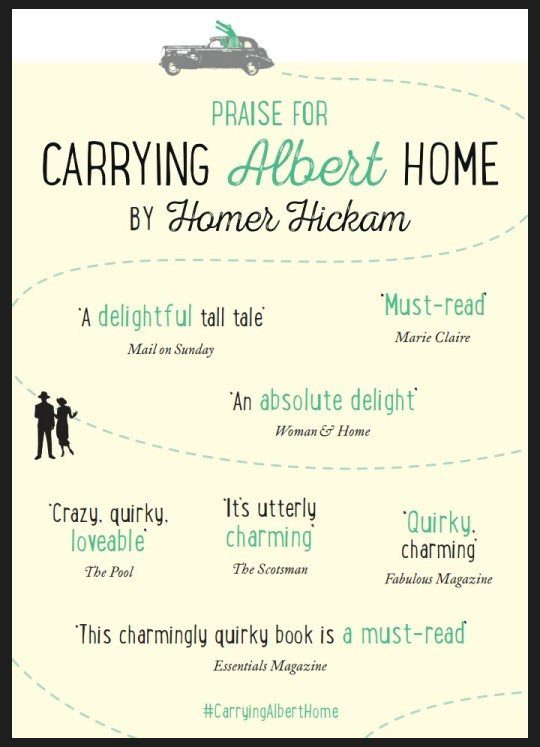
Here’s some information about this lovely book from its publisher HarperCollins:
From
the bestselling author of Rocket Boys
comes a long awaited prequel. BIG FISH meets THE NOTEBOOK in this somewhat true story of a woman, a husband and her
alligator.
In 1930s America,
the Great Depression made everyone’s horizons smaller, and Elsie Lavender found
herself back where she began, in the coalfields of West Virginia. She had just
one memento of her halcyon days – a baby alligator named Albert.
Then one day, her
husband’s stoical patience snapped and Elsie had to choose between Homer and
Albert. She decided that there was only one thing to do: they would carry
Albert home to Florida.
And so began their
odyssey – a journey like no other, where Elsie, Homer and Albert encountered
everything from movie stars and revolutionaries to Ernest Hemingway and
hurricanes in their struggle to find love, redemption, and a place to call
home.
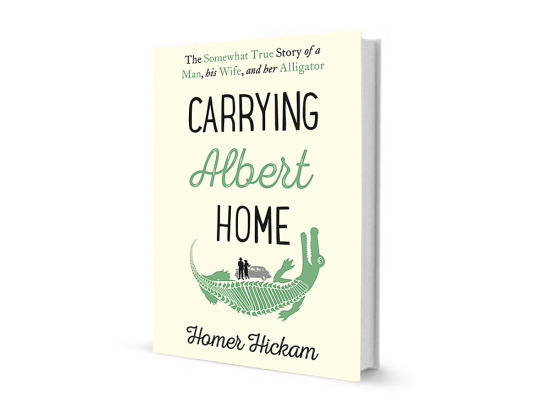
fiction, as you use events from your parents’ lives to create a road trip story
crammed with fantastic adventures. What are the freedoms and challenges of
using real-life material around which you create fiction?
First, let me say I am honoured that you not only read
my work but also have taken the time to ask me some questions about it. Thank
you so much. *interrupts: Aw shucks, you’re welcome, sir!* Carrying Albert Home is a stew of more than a few literary genres
including memoir, historical fiction, myth, humour, and even magical realism.
When I wrote it I didn’t worry too much about anything other than telling a
good story that would make readers laugh while also perhaps giving them some
important things about life to think about, especially that astonishing emotion
we inadequately call love.
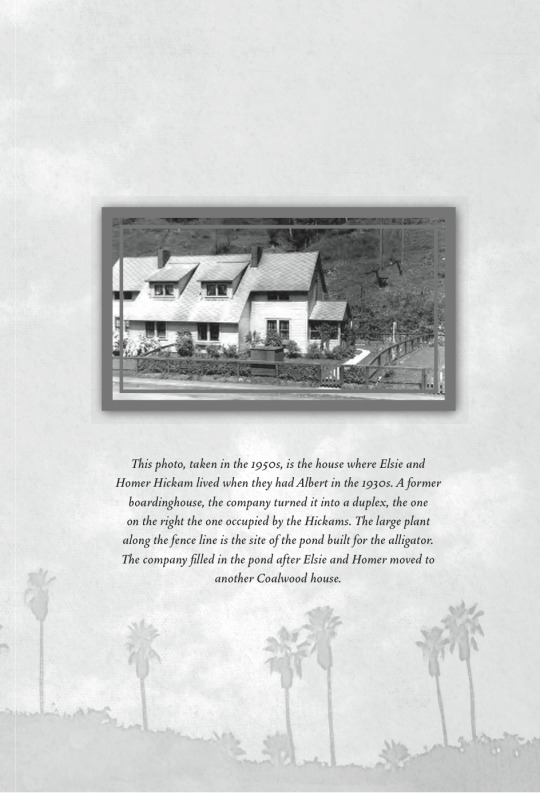
America in the Great Depression. What do you find most interesting about this
part of history? Even though you use a whimsical, humorous style, you don’t
dodge the harsh realities that faced people living in this era. How was that
experience for you, of writing about such difficult times?
Sometimes, humour emerges from the most dreadful of
times and places. It’s sort of like laughing in the face of the devil (as long
as you remember to duck when he takes a swing at you). Homer and Elsie and
Albert had their great journey in 1935 which was in the midst of the Great
Depression so that fact led me to research the era. There was a lot of
desperation in those times but, oddly enough, not in the coalfields where
business was booming. From that came an opportunity to me as a writer, to have
a couple of innocents plunged into the stark reality of what was going on
beyond their mountains.
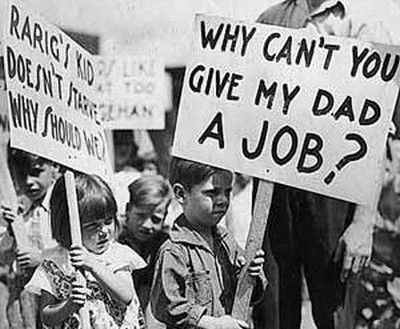
guessing you do, as you’ve just written a cracker of one! What are some of your
favourite books of this type?
Ha ha! Well, right within reach of my desk is a
bookcase that contains Steinbeck’s road trip novels Grapes of Wrath and Travels
with Charlie! It also has a copy of the ultimate American road trip (even
though it’s on a river) Huckleberry Finn.
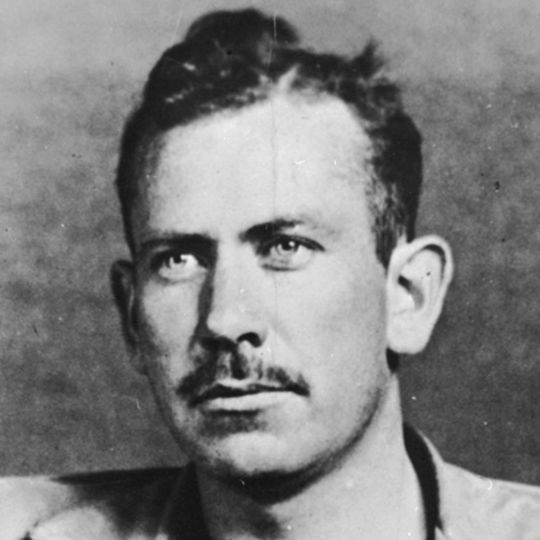
The incomparable John Steinbeck, who also plays a cameo in this novel.
[4] Accompanying Elsie, Homer and their alligator Albert ontheir journey was an enigmatic rooster. What do you think he represents? And
what does the alligator represent, for that matter? Or do they simply represent
themselves? After all, as you write in your book: “Not everything has to have a
meaning, does it?”
My wife, who reads all my stuff first, kept tromping up
the steps to my loft to demand, “Why is the rooster in this book?” I kept
defending him and myself by replying, “I don’t know but he does so I’m
leaving him in.” After reading the draft, my brother said he thought the
rooster was a guardian angel for our future father. Others have suggested the
rooster represents hope since when he shows up, everything seems to get
resolved. I don’t know. In all my years, I’ve only personally known a couple of
roosters but there does seem to be something mysterious about them, all that
crowing at sunrise and all, don’t you think? Albert, of course, was very real
but he was not your normal reptile. There was something inside him, some kind
of spirit that made him different. I just told his story. Maybe part of the fun
is figuring out why he sometimes seems like just an alligator but at other
times something far more.
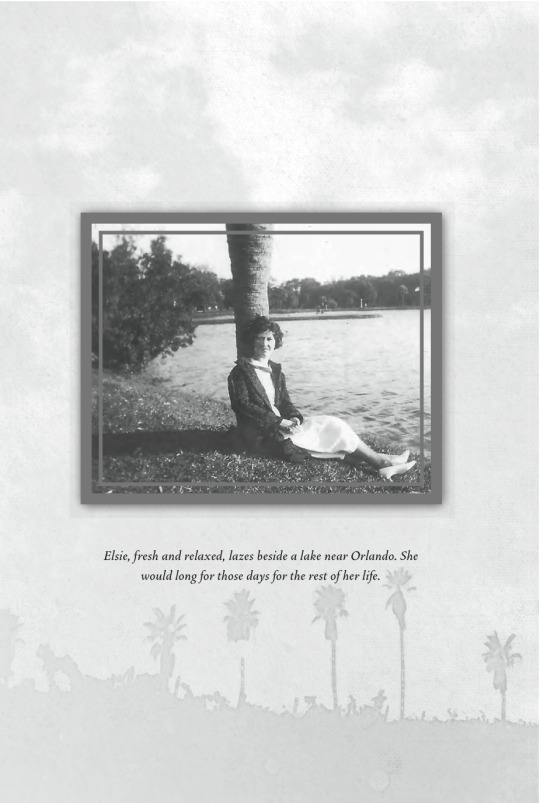
Homer’s mother, Elsie.
[5] I love the fact that John Steinbeck and Ernest Hemingwayplay cameos in the book. How do you feel about these guys? And have these
authors influenced you?
Both authors were big favourites in my house while I
was growing up! Mom (Elsie) had a copy of Sweet
Thursday signed by Steinbeck which she treasured. Many Hemingway books were
in the book stacks that my dad read. Of the two, I never could get too far into
Hemingway but have read everything by Steinbeck. In fact, our styles are
somewhat similar which means when I’m writing, I’d better not read anything by him
lest I end up writing bad Steinbeck!
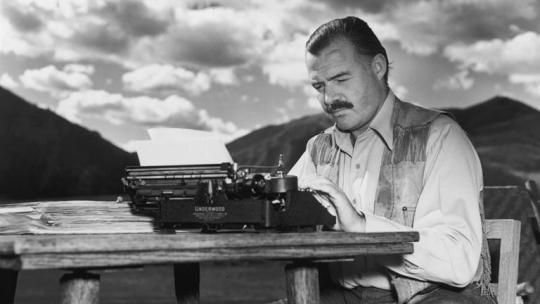
Ernest Hemingway doing what he did best.
[6] Many of the book’s adventures take in classic Americanicons or themes, such as baseball, aviation, movies, Prohibition etc – like a
potted history of early C20th America! How deliberate was this, or was it
simply a case of imagining fun things for them to do?
Indeed, these things were American icons, especially of
the 1930s, so naturally they were in my mind when I set out to recreate my
parents’ great road trip. I’d also heard a lot of things from them about their
trip with Albert so I had a guide to mapping out the novel. However, that
didn’t mean I included everything they told me over the years. No, that’s the
beauty of being the storyteller. I got to choose what I perceived were going to
the best (meaning the most fun) to write about!
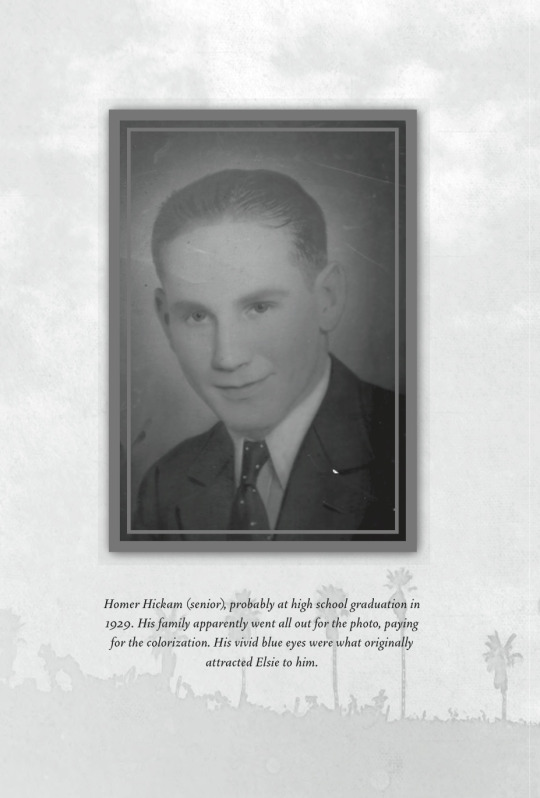
Homer’s father, Homer senior.
[7] I’m a big fan of baseball stories – The Natural, RingLardner, Field of Dreams – do you love baseball stories too? There seems a real
reverence for baseball in Homer’s feelings about looking out at the field from
the dugout. Does that come from you too? What is it about baseball that lends
itself so well to fiction?
I read more than a few baseball stories, mostly
nonfiction, while contemplating that part of Carrying Albert Home. I knew a few basic facts, that my dad loved
baseball, that he used to be a great player, that he’d played semi-pro ball,
but something had happened to his hand to keep him from playing. In order to
write about the disappointment he had to feel when he couldn’t play any more, I
first needed to understand his love of the game so I read books written by
writers who loved it, too. I absorbed all that, then visited a ballpark to get
a sense of the smell, touch, taste, and atmosphere of the place. I felt my
father with me when I did. It was a strange but lovely moment. As for why
baseball lends itself so well to fiction, the whole game is a metaphor about
striving toward perfection which is, of course, an impossible goal bound to
cause drama and frustration.
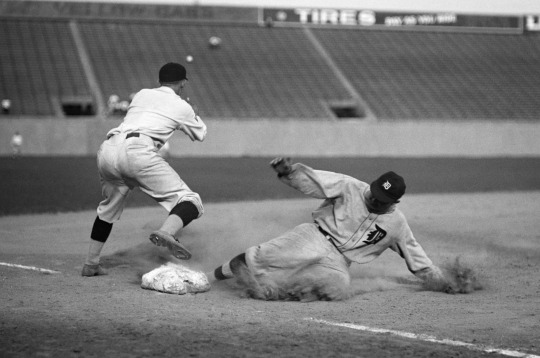
writing a book all about an aviatrix in the very early days of flight! As part
of my research, I recently went flying in a light aircraft for the first time
and it was bloody marvellous! How was your first flight? Terrifying, exciting,
a mixture of both?
My first flight – wait for it – was with Elsie although
she wasn’t the pilot. It was on a DC-3 twin-prop passenger plane from West
Virginia to South Carolina. Most of what I recall about it was how much SHE
enjoyed it. Every time we hit an air bump, which was kind of scary, she laughed
and sometimes even clapped her hands. I later became a pilot but never took her
flying. In a way, I regret that but, in another way, I don’t. She’d have
probably insisted on taking the stick and then killed us both.
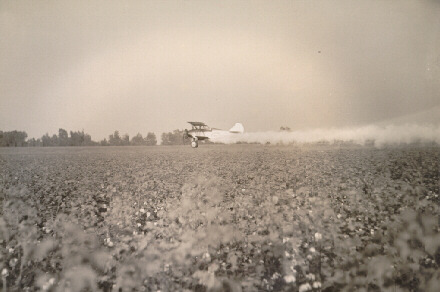
1930s crop duster plane
https://libraries.uark.edu/SpecialCollections/ardiglib/leewilson/agri.html
[9] Your chapter about the hurricane fascinated me as Ialready knew about this event from a brilliant book by my writing friend
Vanessa Lafaye, ‘Under a Dark Summer Sky’ (AKA ‘Summertime’ in the UK). What
was it about this particular event that made you want to write about it?
The great 1935 Florida hurricane is popularly known as
“Hemingway’s hurricane.” I read several books about it and, like you,
became fascinated by this great storm which most Americans know nothing about.
It was not only a disaster to the people caught in it but a political disaster
as well for the Roosevelt Administration. It was one of the reasons why
Hemingway became a Republican. The combination of Hemingway, a vast storm, and
my parents’ proximity to both the great writer and the hurricane in 1935 was
too much to resist!
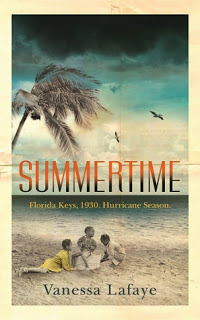
famously about your experiments with rockets as a lad. Your scientific mind
must have manifested itself pretty early on in your life. In my second novel,
about an C18th female scientist, I researched the minds of scientists (as I
don’t have one), including reading Richard Feynman’s autobiography. I wanted to
understand how scientists saw life from their earliest days. How did you see
the world as a boy?
Actually, as a lad, I was a pretty dim bulb when it
came to math and the sciences. My nose was always in a book and writing
stories, mostly to amuse my mom who kept making me go back to perfect my
sentences. My third grade teacher said some day I’d make my living as a writer.
Nobody expected me to go into science or engineering. I blame it on science
fiction for making me decide to become an engineer. When Sputnik was launched
in 1957, I felt like I was in a Jules Verne novel! I also started building
rockets just like in a Robert Heinlein novel. Since I wasn’t particularly
oriented toward science and math, I had to study extra hard to become an
engineer but I was also about the only student in engineering school who made
perfect marks in writing, literature, and English. That, at least, kept my
overall grade average up! Still and all, I’m glad I went into engineering and ended
up working for NASA. Not only was it a great job and I met a lot of interesting
people, it gave me the perfect ending to Rocket
Boys!
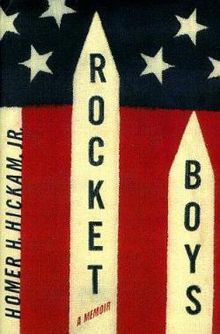
(palaeontology), the near past (your family memoirs & WW2 novels) and the
future (your sci-fi novels). How do you feel about time?
Time, as I wrote in The
Dinosaur Hunter, can be best understood as a vast sea. One of my characters
explains it this way: “The more we understand time, the more we realize
how connected it is. It’s like a deep ocean. The water at the bottom is the
same as at the top except they’re in different places. But there’s nothing to
keep the water from changing places and sometimes it does, usually because of
temperature or salinity changes or the pressure of the overlying water. Anyway,
the important thing is that it goes from water we can see and touch to water
beyond our reach. That’s like present time turning into ancient time and vice
versa. It’s all connected.” The character then goes on and says it’s all
too “deep” for her. Well, maybe me, too!
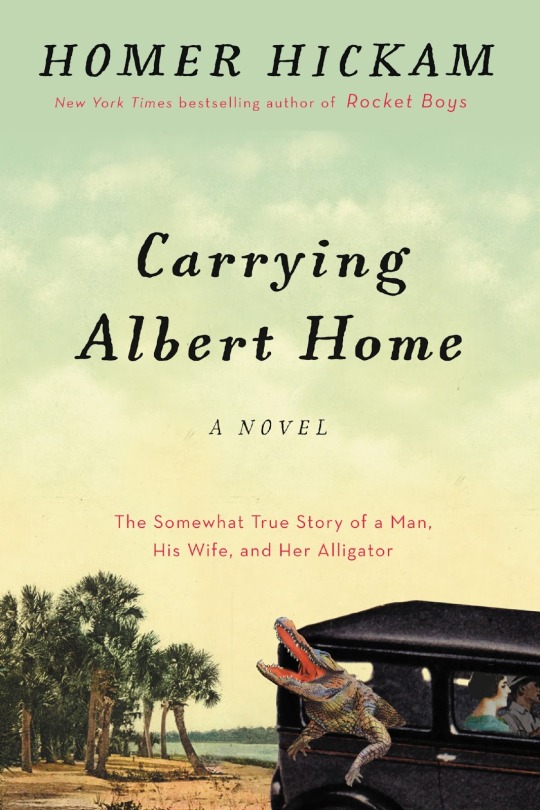
writing next?
I’m trying on a few novels for size in my head right
now. I’d love to write more about Homer and Elsie and maybe little Sonny (that
would be me) in the years after Albert but I don’t much want to jump into it
without knowing where I’m going. Of course, I don’t have to know exactly since
I don’t do book outlines (what fun would that be?) but I do want to have a
worthy concept in mind. There are some other stories I want to write, too.
Sometimes, I have to be a little patient and let the next story, or the
characters in them, start nagging at me to get going. You know exactly what I
mean, don’t you? Thank you again so much for the questions! *I do know what you mean – that little, insistent voice that all writers must obey! And you’re welcome. :-)*
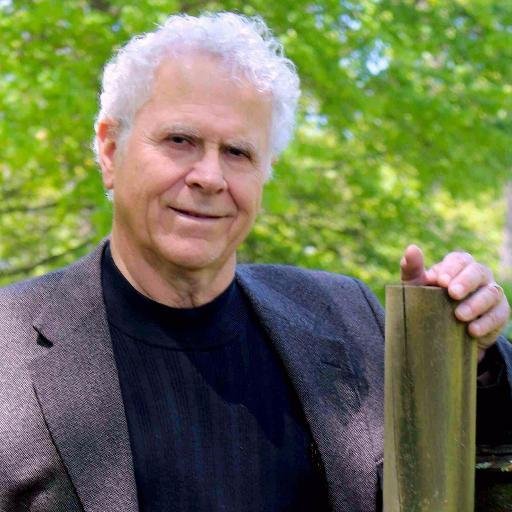
Thanks so much to Homer for such delightful, witty answers! Do read his book and escape from all the political madness going on these days into 1930s America and the quirkiest road trip ever.
Thanks to Hayley Camis at HarperCollins for sending me this wonderful book.
You can find Homer online here:
https://twitter.com/HomerHickam